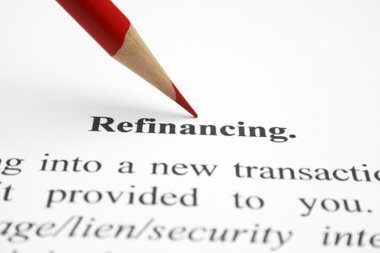
Mortgage Refinancing for the Self-Employed
Qualifying for a mortgage loan can be difficult if you're self-employed. That's especially true if you report your income on Schedule C for federal income tax purposes.
"The ones that usually have the hardest time qualifying as self-employed are not those who are involved with a corporation," says Ryan Leahy, sales manager at Mortgage Network, a mortgage loan company in Danvers, Mass. "They are the sole proprietor."
Difficult, yes. Impossible, no.
Steady income: the major stumbling block
When I refinanced as a self-employed borrower in 2014, I was able to get a new 30-year mortgage with a very favorable rate. But the process was complicated, uncertain, nerve-wracking, time-consuming, and expensive.
My credit scores were in the 800-plus range and my house was worth more than double my loan amount, giving me a loan-to-value ratio of less than 50 percent. I didn't take cash out, and I paid all but $400 of my closing costs out-of-pocket.
The stumbling block was that I had to prove that my freelance income was consistent and reliable. The fact that I'd prepared my own tax returns made that even more difficult. The lender's solution? They researched articles I'd published online and demanded the names and telephone numbers of my editors. I complied, calls were made and my loan was closed.
It’s often difficult for business owners, freelancers, and gig workers to document their income. This usually means needing to submit more paperwork when applying for a refinance.
What lenders look for in self-employed refinance applications
Generally, lenders consider self-employed borrowers to be riskier due to their unpredictable incomes. For this reason, you may need to meet more stringent lender requirements to secure a mortgage refinance. Here are some of the factors lenders may look into before approving your refinance mortgage application:
Credit score
A credit score reflects your credit history and creditworthiness. It’s based on information from your credit report and demonstrates how well you manage personal credit. FICO scores range from lows of 300 to highs of 850.
While good credit doesn’t always guarantee approval, very good credit scores of 740-799, or exceptional ones of 800-850 will get you lower interest rates and increase your chances of getting a refinance. Lenders may look into both your personal and business credit ratings.
Debt-to-income ratio (DTI)
Debt-to-income ratio is a percentage of your monthly gross income that’s needed to cover required monthly debt payments. . A low debt-to-income ratio means you’ll be allowed to qualify for a larger mortgage amount. Typically, and including your mortgage, a lender will allow you to carry a DTI ratio of up to 43%.
Personal and business income
A lender will want to see proof of income to assess your ability to repay your mortgage. Business income may fluctuate and is often reduced by tax deductions in order to minimize tax liabilities. For this reason, a lender would want evidence that your business is stable and enjoys healthy cash flow. To prove this, you may need to provide personal and business bank statements as well as tax returns.
Employment history
How long have you been self-employed? To qualify for a refinance, homeowners generally need at least 2 years of verifiable self-employed income. Employed persons have the benefit of pay stubs or W-2s, but self-employed people may be required to provide personal tax returns as proof.
Credit utilization
The credit utilization ratio is a percentage of your available credit that is in use. A low credit utilization ratio of 30% or below is recommended as it indicates you’re not relying heavily on credit.
Home equity
Home equity is the amount of your home that you actually own. It is the difference between the current value of the home and the amount you owe on any existing mortgages. For example, if your home is valued at $300,000 and your mortgage balance is $200,000, your home equity is $100,000. Provided you’re not taking any cash out as part of the refinance, you can have as little as 5% equity in the property, but anything less than a 20% stake will require Private Mortgage Insurance (PMI).
Related: Estimate your home equity with HSH's KnowEquity calculator
Proof of your self-employed income
Leahy says extra hoops are still common for self-employed borrowers. Some occur at the application stage, others when the loan moves forward to the lender's compliance or operations department.
Lenders need evidence that you’ll be able to afford your monthly payment. Here are the documents you may be required to submit during your refinance loan application:
Business license to verify the existence of your business
Copies of business and personal tax returns for the recent two years
Schedule K-1 to disclose your share of earnings if your business is an S-corp or partnership
A year-to-date profit and loss statement. Also known as an income statement, a P&L statement shows your gross income and business expenses during a specific time period
"Tax preparers know that if there are too many write-offs and the bottom line is low, the borrower may not qualify for a mortgage loan," Leahy cautions.
Signed letters from a certified CPA verifying how long you've been in business and that your business is still a going concern
Recent personal and business bank statements. Document requirements can vary depending on the lender and the type of loan you are seeking. Be sure to check with your lender to determine exactly what documentation they’ll need from you.
Next steps if your application is denied
A lender may reject your refinance application on different grounds. The most common reasons are a weak credit score, a high debt-to-income ratio, or insufficient income. Find out why your application was denied to resolve the rejection., and then consider these steps you can take to remedy your refinance application:
Look into your credit score. Request for a free credit report to check if there are any errors and resolve them. To boost your credit score, stick to your credit limits and pay down your debts including credit card balances.
Lower your debt-to-income ratio. You can bring down your DTI ratio by paying off your existing debt faster. A similar approach would be to not take on more debt but instead increase your income.
Refinance using a bank statement loan. If you don’t have two years of tax returns to verify your income, a bank statement loan may be a good option. Bank statement loans are based on the total money coming to your bank account, not income. However, they come with higher interest rates.
Get a co-signer. If you’ve insufficient income you can bring someone else like a spouse into the mortgage transaction. Adding a co-signer to your application can add more income or enhance your credit score to help you qualify for a refinance you can't get on your own.
More advice for self-employed mortgage refinancing
Here are some other tips to keep in mind:
Allow plenty of time to close. I had a 45-day rate lock and needed almost all of those days to resolve my income verification issue.
Prepare all your information. Be ready to provide more than the standard documentation.
Expect to be Googled. Have a professional website or online presence that shows your business is legitimate.
Be responsive. Acknowledge every request from your lender as soon as possible, even if it's just to say you received it and will comply as soon as you can.
Focus on your goal. The paperwork can be a hassle, but in the end, you should be happy with your new mortgage loan.
Mortgage loan guidelines are complicated, and there can be exceptions every step of the way from application to closing. Shop around, ask questions and discuss your personal situation with your mortgage lender.
This article was edited by Keith Gumbinger. (Photo: alexskopje/ThinkStock)




A financial blogger said there was a way to qualify for a HARP refinance with a bank balance sufficient to cover a year's worth of payments, for people whose income is hard to document or fluctuates a lot. Quicken denied knowledge of this HARP-qualification method. I know HARP ended, but I'm curious about this. Do you know if the blogger was correct?
In HARP cases where the refinanced payment had less than a 20% increase above the old, lenders were permitted to use a "Reserve Alternative" method to verify sufficient income for the new mortgage. From the Fannie Mae "Selling Guide" (Selling Guide B5-5.2-02: DU Refi Plus and Refi Plus Underwriting Considerations)Reserve alternative: Verification of liquid financial reserves equal to 12 months of the new mortgage payment (PITIA) on the subject property. These reserves must be documented with at least one recent statement (monthly, quarterly, or annual) and are limited to the following types of liquid assets:checking or savings accounts, certificates of deposits, and money market funds;investments in stocks, bonds, mutual funds; andthe amount vested in a retirement savings account (that is available to the borrower).Lenders are not required to investigate large deposits that appear on the statements. However, certain assets must be “discounted” when used for reserves.
Nice sage advice! Thank you
I was denied for a refinance with a harp lender.due to my income as self employed.never been late on a payment since 2006.but on paper the numbers are low.does any body knows.what to do?called the bank that has my loan.closing cost were higer,possible morgage insurance if value is less than expected,plus apraisal.from an ARM to a fixed ,and closing cost and fees up to 4,000.00.and after all said and if done, no monthly savings.except a fixed rate.
I was recently turned down for a re-fi of a heloc by the very bank that made the loan in the first place. Here are the facts. I have 4 condos worth total $850,000. 1 owe 36k 1 owe 26k 1 owe 8k 32k heloc 1 free and clear. $20,000 cash in the bank, no credit card debt, no automobile debt. $4200/mo income. They charged me $500 "application fee" ran me around for two months, reported the loan in default after refusing any payments and then turned me down for the $32,000 loan. They stole my $500. I think they turned me down because they think I can't pay the loan back and they can forclose. I'm paying it off in full today!
True Grit, Unfortunately, there is not enough information in your comment to help us fully address your concerns -- we are left with more questions than answers. Here are some questions we have: 1. What reason did the bank give you for turning you down? They have to give you a reason. 2. Are you self-employed? Do you have consistent income from a source other than investments? 3. Did you have trouble compiling the necessary documentation to support the loan application? Unfortunately, your bank is not required to return the $500. That is theirs. We would love to help you further. Thanks for writing in, we hope to hear from you soon. -Tim Manni, HSH.com.